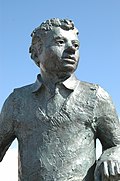Portal:Poetry
Welcome to the Poetry Portal


Poetry (from the Greek word poiesis, "making") is a form of literary art that uses aesthetic and often rhythmic qualities of language to evoke meanings in addition to, or in place of, literal or surface-level meanings. Any particular instance of poetry is called a poem and is written by a poet. Poets use a variety of techniques called poetic devices, such as assonance, alliteration, euphony and cacophony, onomatopoeia, rhythm (via metre), and sound symbolism, to produce musical or incantatory effects. Most poems are formatted in verse: a series or stack of lines on a page, which follow a rhythmic or other deliberate pattern. For this reason, verse has also become a synonym (a metonym) for poetry.
Poetry has a long and varied history, evolving differentially across the globe. It dates back at least to prehistoric times with hunting poetry in Africa and to panegyric and elegiac court poetry of the empires of the Nile, Niger, and Volta River valleys. Some of the earliest written poetry in Africa occurs among the Pyramid Texts written during the 25th century BCE. The earliest surviving Western Asian epic poem, the Epic of Gilgamesh, was written in the Sumerian language.
Early poems in the Eurasian continent evolved from folk songs such as the Chinese Shijing as well as from religious hymns (the Sanskrit Rigveda, the Zoroastrian Gathas, the Hurrian songs, and the Hebrew Psalms); or from a need to retell oral epics, as with the Egyptian Story of Sinuhe, Indian epic poetry, and the Homeric epics, the Iliad and the Odyssey. (Full article...)
Selected article

Verses in the Ramayana are written in a 32-syllable meter called anuṣṭubh. The Ramayana was an important influence on later Sanskrit poetry and Hindu life and culture. Like the Mahabharata, the Ramayana is not just a story: it presents the teachings of ancient Hindu sages (Vedas) in narrative allegory, interspersing philosophical and devotional elements. The characters Rama, Sita, Lakshman, Bharata, Hanuman, and Ravana are all fundamental to the cultural consciousness of India, Nepal, and many south-east Asian countries such as Thailand and Indonesia. (Full article...)
Selected image
Poetry WikiProject

Selected biography

Although Thomas was appreciated as a popular poet in his lifetime, he found earning a living as a writer difficult, which resulted in his augmenting his income with reading tours and broadcasts. His radio recordings for the BBC during the latter half of the 1940s brought him to the public's attention and he was used by the Corporation as a populist voice of the literary scene. In the 1950s, Thomas travelled to America, where his readings brought him a level of fame, though his erratic behaviour and drinking worsened. His time in America cemented Thomas' legend, where he recorded to vinyl works such as A Child's Christmas in Wales. (Full article...)
Did you know (auto-generated) -

- ... that Adolphe Jacquies was arrested for publishing a poem?
- ... that Manuel Carpio's 1849 poem is the earliest literary depiction of the weeping ghost La Llorona?
- ... that Jack G. Downing, the only person to serve as CIA station chief in Moscow and Beijing, "read Chinese poetry for kicks"?
- ... that the 16th-century poet Fuzuli wrote a poetic letter titled "Complaint" after Ottoman officials cut his stipend?
- ... that a 14th-century work, originally attributed to another poet, was discovered in 2018 to be the creation of the Azerbaijani poet Yusuf Meddah?
- ... that Benjamin Tompson's poem "Harvardine Quils" called for writers in New England to memorialize the loss of "whole towns and Churches" in King Philip's War?
Selected poem
| Mandala 1, Hymn 1, Rigveda by anonymous |
|---|
1. I Laud Agni, the chosen Priest, God, minister of sacrifice, The hotar, lavishest of wealth. 2. Worthy is Agni to be praised by living as by ancient seers. He shall bring. hitherward the Gods. 3. Through Agni man obtaineth wealth, yea, plenty waxing day by day, Most rich in heroes, glorious. 4. Agni, the perfect sacrifice which thou encompassest about Verily goeth to the Gods. 5. May Agni, sapient-minded Priest, truthful, most gloriously great, The God, come hither with the Gods. 6. Whatever blessing, Agni, thou wilt grant unto thy worshipper, That, Angiras, is indeed thy truth. 7. To thee, dispeller of the night, O Agni, day by day with prayer Bringing thee reverence, we come 8. Ruler of sacrifices, guard of Law eternal, radiant One, Increasing in thine own abode. 9. Be to us easy of approach, even as a father to his son: Agni, be with us for our weal. |
Related portals
Topics
Recognized content
Categories
Associated Wikimedia
The following Wikimedia Foundation sister projects provide more on this subject:
-
Commons
Free media repository -
Wikibooks
Free textbooks and manuals -
Wikidata
Free knowledge base -
Wikinews
Free-content news -
Wikiquote
Collection of quotations -
Wikisource
Free-content library -
Wikiversity
Free learning tools -
Wiktionary
Dictionary and thesaurus






















